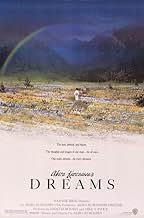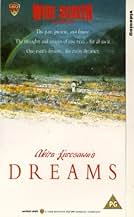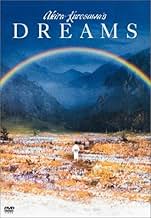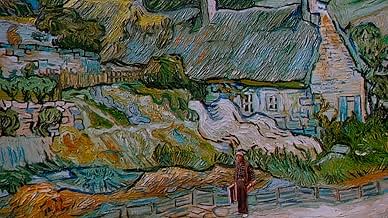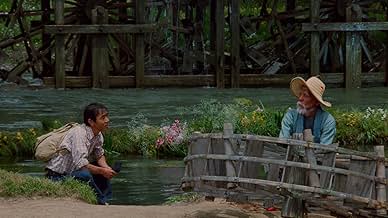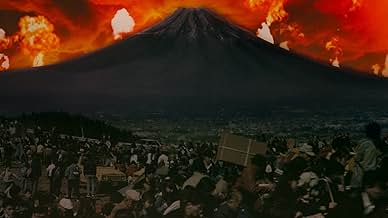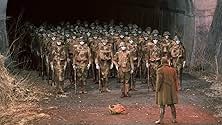AVALIAÇÃO DA IMDb
7,7/10
31 mil
SUA AVALIAÇÃO
Uma coleção de histórias baseadas nos sonhos reais do diretor Akira Kurosawa.Uma coleção de histórias baseadas nos sonhos reais do diretor Akira Kurosawa.Uma coleção de histórias baseadas nos sonhos reais do diretor Akira Kurosawa.
- Direção
- Roteiristas
- Artistas
- Prêmios
- 3 vitórias e 12 indicações no total
- Direção
- Roteiristas
- Elenco e equipe completos
- Produção, bilheteria e muito mais no IMDbPro
Avaliações em destaque
I was pleasantly surprised with dreams, not only in terms of content but also aesthetically. There are very few films that manage to embody personal, local and global concerns as Akira Kurosava has managed in this production. There are so many underlying topics that it is difficult to concentrate in just a few for the purpose of this review, but I believe it is fair to say that Dreams portrays our individual and collective dreams and nightmares, reflecting that sometimes what we dream of today is what will keep us awake tomorrow. A nice range of representations of concerns from the deepest and most personal childhood worries and fantasies to the more complex issues of mental illness, extreme ambition, destruction of our environment and death. In all I recommend this film to anyone who has the chance to see it, It is possible that Dreams may not appeal to a mainstream audience in terms of content because there is a lot of symbolism and critical engagement but the photography and sceneries are for sure something that should not go amiss for anyone. If you get the chance it is truly worth giving it your time, a fantastic experience.
Akira Kurosawa's insights on man's need to harmonize with nature, the costs of war and the bad fruits that nuclear power can bear. This is the first Kurosawa movie I have seen, but I can see how true it is that Kurosawa is a master of creating atmosphere in a film. Such as the dark, post-nuclear apocalyptic world of THE WEEPING DEMON. Or the very first episode when the little boy sees something he is not supposed to see in the forest.
I found THE BLIZZARD rather strange, and you'll see a scary part when the mountainman is having his mirage of the beautiful woman who symbolizes the snowstorm. I'm not sure what the significance of the dog was in THE TUNNEL, but I guess it illustrates the fact that though he was the commander of Third Platoon , he felt like a coward because of his command, his men paid the price.... yet he is guilty of still being alive; he's afraid of the dog.
It ends rather low key, but the last episode THE VILLAGE IN THE WATERMILLS is the most insightful and bold in expressing the movie's theme... of harmonizing with nature, and maybe harmonizing with ourselves.
The procession displays the unity and the communal harmony that the villagers have. And it is the exact opposite of what is grieved about in MOUNT FUJI IN RED or THE WEEPING DEMON. The cinematography is just beautiful. The movie is beautiful and captivating.
Akira Kurosawa's YUME is Grade A- 9/10
I found THE BLIZZARD rather strange, and you'll see a scary part when the mountainman is having his mirage of the beautiful woman who symbolizes the snowstorm. I'm not sure what the significance of the dog was in THE TUNNEL, but I guess it illustrates the fact that though he was the commander of Third Platoon , he felt like a coward because of his command, his men paid the price.... yet he is guilty of still being alive; he's afraid of the dog.
It ends rather low key, but the last episode THE VILLAGE IN THE WATERMILLS is the most insightful and bold in expressing the movie's theme... of harmonizing with nature, and maybe harmonizing with ourselves.
The procession displays the unity and the communal harmony that the villagers have. And it is the exact opposite of what is grieved about in MOUNT FUJI IN RED or THE WEEPING DEMON. The cinematography is just beautiful. The movie is beautiful and captivating.
Akira Kurosawa's YUME is Grade A- 9/10
Going back to what made Akira Kurosawa a star, Dreams is a film driven by a completely original concept. Like Rashomon, this is something that had never been done before. To my knowledge, nobody since has had the skill or guts to make a movie that accurately captures the spirit of........ bizarre Dreams. These stories are filmed and written just like real dreams. They're full of strange events that most of the time make no sense, yet everyone in the story totally believes it to be normal.
My favourite segments are "The Tunnel", as story where a former military commander encounters the ghosts of all the soldiers who died under his command. The Commander explaining why his soldiers died is hands down the best acting in the movie. My second favourite wold be "The Peach Orchard". This is about a young boy that finds a group of living dolls in the fields. The dolls are furious that the boy's family have destroyed all the peach tress in the Orchard. This segment was the most dreamlike. My third favourite would be "Mount Fuji In Red". In that there is a nuclear meltdown. Panic spreads and a few survivors contemplate whether or not to end their lives.
In traditional Kurosawa fashion, this movie is visually breathtaking. Kurosawa films don't just look great, they look unique and interesting. The visuals in Dreams helps create the hypnotic dream-like state. In the "Crows" story, a man enters the world of a Van Gogh painting. Parts of the scenery here are natural landscapes, and parts are made to look like a painting. In "Blizzard" mountain climbers are on the verge of death. They're rescued by a snow spirit. The blinding snow and the sort of slow motion effect when you see the Snow Fairy makes this segment perhaps the most hypnotic images Kurosawa has ever produced.
I wouldn't want anyone to get the idea that this is just a bunch of unconnected segments. Several characters appear in various segments, and some are meant to play back to back. I have to say that Dreams may not be for everyone. I'd recommend everyone alive check it out, though. Some may love it, some may not understand it. I'm on the side of this being one of the last brilliant works of the World's greatest Director.
My favourite segments are "The Tunnel", as story where a former military commander encounters the ghosts of all the soldiers who died under his command. The Commander explaining why his soldiers died is hands down the best acting in the movie. My second favourite wold be "The Peach Orchard". This is about a young boy that finds a group of living dolls in the fields. The dolls are furious that the boy's family have destroyed all the peach tress in the Orchard. This segment was the most dreamlike. My third favourite would be "Mount Fuji In Red". In that there is a nuclear meltdown. Panic spreads and a few survivors contemplate whether or not to end their lives.
In traditional Kurosawa fashion, this movie is visually breathtaking. Kurosawa films don't just look great, they look unique and interesting. The visuals in Dreams helps create the hypnotic dream-like state. In the "Crows" story, a man enters the world of a Van Gogh painting. Parts of the scenery here are natural landscapes, and parts are made to look like a painting. In "Blizzard" mountain climbers are on the verge of death. They're rescued by a snow spirit. The blinding snow and the sort of slow motion effect when you see the Snow Fairy makes this segment perhaps the most hypnotic images Kurosawa has ever produced.
I wouldn't want anyone to get the idea that this is just a bunch of unconnected segments. Several characters appear in various segments, and some are meant to play back to back. I have to say that Dreams may not be for everyone. I'd recommend everyone alive check it out, though. Some may love it, some may not understand it. I'm on the side of this being one of the last brilliant works of the World's greatest Director.
Sentimentally I love this film, made by Kurosawa when he was 80 and one of his last. The great director gives us eight vignettes that often seem more like messages than dreams, speaking to the danger of nuclear power, damaging the environment, and senseless death in war. Guilt is a recurring theme, and as the film covers childhood to old age, it seems very personal to Kurosawa's own life. The images are often beautiful, and I absolutely loved dream #5, "Crows," where an art student runs through Van Gogh's paintings and meets him. The highlighted work, "Wheatfield with Crows" is so profoundly meaningful to the end of Van Gogh's life that seeing it here in the elderly Kurosawa's work gave me goosebumps. I didn't mind the preachiness that's in several of the other dreams too much, though it did take away from the film's surreal feeling, but the bigger issue was pace, which was almost always too slow. It's a must-watch film for fans of Kurosawa and I'm glad I saw it, but it needing paring down.
I am not inclined to post my opinion on web pages. In fact, this is the first time that I feel compelled to let my words be heard on the web. However, having read from other users that "Yume" is "a waste of time" and "too personal" to be enjoyed, I was so disappointed that I felt the right time to speak up had come.
I am the first one to agree that this is not a film for everyone. It is actually far from that. Alas, in this world where the vastest majority of people feel that the necessary and sufficient condition for a film to be good is to have as much special effects as possible, "Yume" sadly faces no other fate than to be overlooked by almost everybody.
It is those few people that might consider watching this film that have the opportunity to appreciate its full greatness. There are still many hurdles on the way, though. For many Western people, including myself, the fact that "Yume" orbits around Japanese legends is a big obstacle to overcome, as we are not well acquainted with their meaning. I am convinced that Kurosawa's "Dreams" conceal much of their true objective to us who are not familiar enough with the Japanese culture.
But my advice is: forget these problems. There are thousands of other details to enjoy. From just a cinematographic point of view, Kurosawa's mastery of colour is unrivaled, and a sound reason to watch this film, yet not the only one by far. The true value of "Yume", in my opinion, is the use of the parabolas presented disguised as dreams to teach us a way of life. The absurdity of war. The beauty of nature. The need to preserve our environment. In summary: a praise to life. And yet, Kurosawa being old himself when he filmed his "Dreams", looks at death and presents it as the last station of a wonderful journey. Carpe diem, yes, but not to the point of being scared. Life will follow its course as does the river at the end of the movie, with or without us being here to enjoy it. Just be thankful for the small things in life; they are the most important. Enjoy them while you can and you will leave this existence in peace with yourself.
"Yume" is one of these small, humble things, so humble that it can be overlooked by many. It would be a waste. Don't let this happen to you. You would miss a true masterpiece. You would miss Kurosawa's way of life.
I am the first one to agree that this is not a film for everyone. It is actually far from that. Alas, in this world where the vastest majority of people feel that the necessary and sufficient condition for a film to be good is to have as much special effects as possible, "Yume" sadly faces no other fate than to be overlooked by almost everybody.
It is those few people that might consider watching this film that have the opportunity to appreciate its full greatness. There are still many hurdles on the way, though. For many Western people, including myself, the fact that "Yume" orbits around Japanese legends is a big obstacle to overcome, as we are not well acquainted with their meaning. I am convinced that Kurosawa's "Dreams" conceal much of their true objective to us who are not familiar enough with the Japanese culture.
But my advice is: forget these problems. There are thousands of other details to enjoy. From just a cinematographic point of view, Kurosawa's mastery of colour is unrivaled, and a sound reason to watch this film, yet not the only one by far. The true value of "Yume", in my opinion, is the use of the parabolas presented disguised as dreams to teach us a way of life. The absurdity of war. The beauty of nature. The need to preserve our environment. In summary: a praise to life. And yet, Kurosawa being old himself when he filmed his "Dreams", looks at death and presents it as the last station of a wonderful journey. Carpe diem, yes, but not to the point of being scared. Life will follow its course as does the river at the end of the movie, with or without us being here to enjoy it. Just be thankful for the small things in life; they are the most important. Enjoy them while you can and you will leave this existence in peace with yourself.
"Yume" is one of these small, humble things, so humble that it can be overlooked by many. It would be a waste. Don't let this happen to you. You would miss a true masterpiece. You would miss Kurosawa's way of life.
Você sabia?
- CuriosidadesAkira Kurosawa had trouble getting financing from studios in Japan, blaming much on the political nature of his criticism of nuclear power in the film. He sent a copy of his script to Steven Spielberg, who liked it, and helped get a deal for the film through Warner Bros.
- ConexõesEdited into Gli ultimi giorni dell'umanità (2022)
- Trilhas sonorasIn the Village
(from "Caucasian Sketches, Suite for Orchestra Op. 10, No. 2")
Music by Mikhail Ippolitov-Ivanov (as Ippolitov-Ivanov)
Conducted by Vladimir Fedoseyev (as Vladimir Fedoseev)
Performed by Moscow Radio Symphony Orchestra
Principais escolhas
Faça login para avaliar e ver a lista de recomendações personalizadas
- How long is Dreams?Fornecido pela Alexa
Detalhes
- Data de lançamento
- Países de origem
- Idiomas
- Também conhecido como
- Sonhos de Akira Kurosawa
- Locações de filme
- Daio Wasabi Farm, Azumino, Nagano, Japão(The Watermill village)
- Empresa de produção
- Consulte mais créditos da empresa na IMDbPro
Bilheteria
- Orçamento
- US$ 12.000.000 (estimativa)
- Faturamento bruto nos EUA e Canadá
- US$ 1.963.207
- Faturamento bruto mundial
- US$ 2.970.161
- Tempo de duração
- 1 h 59 min(119 min)
- Cor
- Mixagem de som
- Proporção
- 1.85 : 1
Contribua para esta página
Sugerir uma alteração ou adicionar conteúdo ausente



